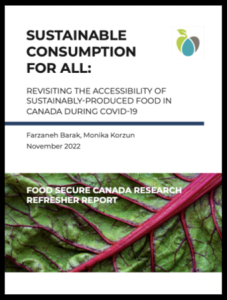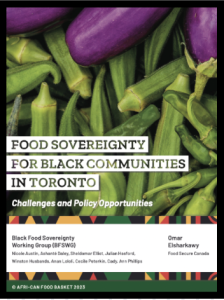Sustainable Food Systems and the SDGs
Food Secure Canada and partners, 2021-2024
Led from Food Secure Canada
 Our approach
Our approach
Food Secure Canada worked with members, partners and allies across the food movement to explore, analyse and make policy recommendations about equitable access, especially towards meeting SDG 2 Zero Hunger, and SDG 1 No Poverty.
Research and partnership with communities underpinned the approach. FSC’s mandate is to amplify the power of diverse voices. Challenging racism, anti-Black racism, and the continuing impacts of colonialism in food systems are at the heart of this approach. A Community Advisory group made up of ten community organisers and engaged academics from six provinces and territories convened virtually four times between June 2021 and October 2022 to guide the initial research and scoping phase of the work.
Outputs
Highlights of our work with partners includes:
Reports & Briefings
- The Sustainable Consumption for All (2022)* research report and launch webinar brought the expertise of community leaders working for food nonprofits and with people experiencing food insecurity, as well industry, government and academic perspectives.
- Insights on Access to Local Food in Francophone Canada (2022) were woven in to the woek, thanks to a research report partnership and public webinar with scholar activists in Quebec.
- Working with the Black Food Sovereignty Working Group (BFSWG) to research and write Food Sovereignty for Black Communities in Toronto: Challenges and Policy Opportunities (2023) This partner has been leading community organisation and policy development centred around challenging ant-Black racism and championing Black Food Sovereignty. It was FSC’s privilege to accompany and learn from them.
- A Policy Synthesis (2024) was prepared on the basis of these written research reports, the knowledge-gathering events below, and the relevant parts of cross-cutting policy work including for Eat Think Vote 2021,and through the civil society Town Halls in 2021 and 2023.
- Briefing civil society members of the Canadian Food Policy Advisory Council (CFPAC) and its Working Group on Reducing Food Insecurity, directly advancing full attainment of SDG Goal 2 Zero Hunger.
- Chew on This! Advised joint campaign on food insecurity for the International Day for the Eradication of Poverty, Oct.17, 2022, with the Dignity for All coalition, Open letter to Minister Freeland et al, recalling SDGs 1 and 2, No Poverty and Zero Hunger.
Events
- Food for the rest of us (sous-titres en francais) film screenings and panel discussions exploring the links between community-led food sovereignty and the SDGs:
- May 2022: Montreal with Forum SAT
- July 2022 : Montreal with Carrefour Centre Sud
- November 2022: Toronto with Centre for Social Innovation, Toronto Youth Food Policy Council, Ojibiikaan Indigenous Cultural Network and Toronto Metropolitan University’s Urban Farm.
- Food Insecurity in Canada / L’insecurite alimentaire au Canada (2022), Identifying policy options to reduce household food insecurity in Canada. An FSC-hosted online webinar with Dr. Valerie Tarasuk of PROOF, the leading Canadian policy research group on food insecurity at the University of Toronto.
- Progress Summit (2021) Ottawa, a roundtable on Food Systems in a Just Economy, in partnership with the Broadbent Institute.

Media coverage highlights
- MacLeans magazine: A glaring omission from Trudeau’s letters to his ministers: hunger
- The Globe and Mail: Bringing everyone to the table to shape a national food policy
- The National Observer: You can help make food fair
- Global Citizen: Why Food Is So Expensive on First Nations Reserves in Canada?
- Open Access Government: Post-COVID, a zero hunger Canada is within reach
Links
Marissa Alexander co-Executive Director of FSC and Leslie Kapo, co-author of the Access to Local Food in Francophone Canada research presented the work of this action area at the public webinar Advancing the SDGs Through Canada’s Food Systems, timestamp 31:16 at the link.
| * Acknowledgement: In addition to the three year contribution funding from Employment and Social Development Canada (ESDC), Sustainable Development Goals (SDG) Funding Program, the Sustainable Consumption for All (2022) research report received funding from Innovation,Science and Economic Development Canada’s Contributions Program for Non-profit Consumer and Voluntary Organizations. The views expressed in this report are not necessarily those of Innovation, Science and Economic Development Canada, ESDC, or the Government of Canada. |


